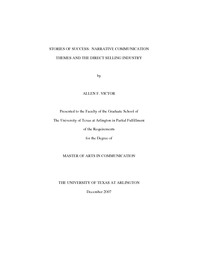
ATTENTION: The works hosted here are being migrated to a new repository that will consolidate resources, improve discoverability, and better show UTA's research impact on the global community. We will update authors as the migration progresses. Please see MavMatrix for more information.
Show simple item record
| dc.contributor.author | Victor, Allen Frederick | en_US |
| dc.date.accessioned | 2008-04-22T02:41:12Z | |
| dc.date.available | 2008-04-22T02:41:12Z | |
| dc.date.issued | 2008-04-22T02:41:12Z | |
| dc.date.submitted | November 2007 | en_US |
| dc.identifier.other | DISS-1904 | en_US |
| dc.identifier.uri | http://hdl.handle.net/10106/720 | |
| dc.description.abstract | Despite the growing scholarly attention given to various aspects of narrative communication, little research has been conducted to identify and document narrative themes used in the storytelling efforts of successful direct selling and network marketing consultants to build their businesses. Such was the focus of this study.
This thesis utilized qualitative research, particularly the method of thematic analysis as developed by Owen (1984), to explore the theoretical perspective of Walter Fisher's Narrative Paradigm. For the purpose of this study, narrative is defined as a "sequential account of events, usually chronologically, whereby sequentiality indicates some kind of causality, and action-accounted for in terms of intentions and deeds and consequences and is commonly given a central place" (Grant, 2004, p.135).
Data for this study consisted of a collection of first-person organizational stories present in Eye on Arbonne documents, which were written by Arbonne International's most successful independent consultants. For this study, "most successful" is defined as consultants who have reached the national vice president compensation level, which is the company's highest level and, subsequently, the most difficult one to achieve.
The study produced several key findings. First, the analysis of stories from Eye on Arbonne documents highlighted one primary narrative theme, Hope, which was supported by five narrative sub-themes: (1) Teamwork (2) Opportunity (3) Perseverance/Stay Committed (4) Believe in Yourself, and (5) Turn Dreams into Reality. Second, the data fully supported the theoretical arguments of Fisher (1978, 1987) and Weick (1995) in terms of affirming the relationship between sensemaking and the use of stories. Finally, in line with Boje's (1991, 2001) views on storytelling as the preferred sensemaking currency in organizations, the practical implications of this research include the possible creation of a replicatable model based on the theme and sub-themes identified in this study, which can be used as a powerful tool for other direct selling and network marketing organizations. | en_US |
| dc.description.sponsorship | Grant, Sasha | en_US |
| dc.language.iso | EN | en_US |
| dc.publisher | Communication | en_US |
| dc.title | Stories Of Success: Narrative Communication Themes And The Direct Selling Industry | en_US |
| dc.type | M.A. | en_US |
| dc.contributor.committeeChair | Grant, Sasha | en_US |
| dc.degree.department | Communication | en_US |
| dc.degree.discipline | Communication | en_US |
| dc.degree.grantor | University of Texas at Arlington | en_US |
| dc.degree.level | masters | en_US |
| dc.degree.name | M.A. | en_US |
| dc.identifier.externalLink | https://www.uta.edu/ra/real/editprofile.php?onlyview=1&pid=1357 | |
| dc.identifier.externalLinkDescription | Link to Research Profiles | |
Files in this item
- Name:
- umi-uta-1904.pdf
- Size:
- 945.8Kb
- Format:
- PDF
This item appears in the following Collection(s)
Show simple item record


